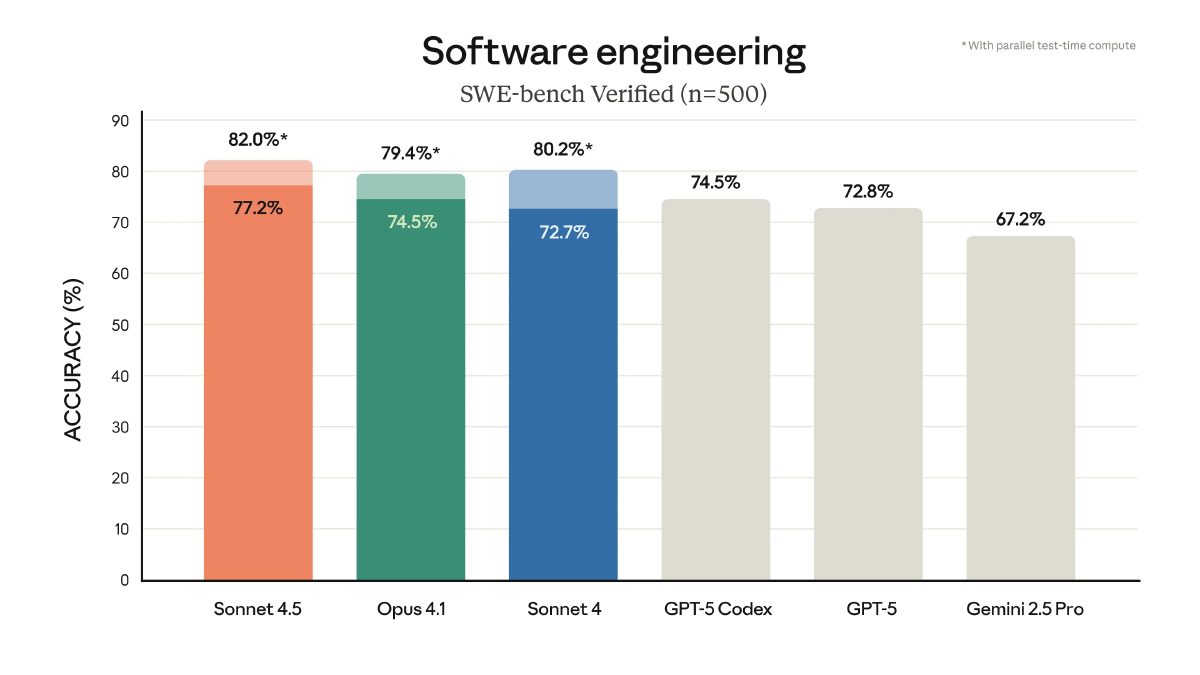Anthropic just dropped their biggest release yet.
Claude Sonnet 4.5 is here, and they’re making bold claims: “the best coding model in the world,” “the strongest model for building complex agents,” and “the best model at using computers.”
But beyond the marketing, this release represents something bigger: Anthropic’s bet that the future of AI isn’t just about chat, it’s about autonomous work.
What makes Sonnet 4.5 different#
🏆 SWE-bench domination#
Claude Sonnet 4.5 leads the SWE-bench Verified evaluation at 77.2% (82% with high compute), significantly ahead of competitors. This benchmark tests real-world software engineering tasks, not toy problems.
⏰ Marathon coding sessions#
The model can maintain focus for more than 30 hours on complex, multi-step tasks. That’s not a typo. We’re talking about AI that can work through architectural changes, debug complex issues, and implement features across entire codebases without losing context.
🖥️ Computer use breakthrough#
On OSWorld (real computer tasks), Sonnet 4.5 scores 61.4% — up from Sonnet 4’s 42.2% just four months ago. The Claude for Chrome extension puts this to work, navigating sites, filling spreadsheets, and completing tasks directly in your browser.
🧮 Reasoning and math gains#
Major improvements across reasoning benchmarks, with domain experts in finance, law, medicine, and STEM reporting “dramatically better” performance compared to older models, including Opus 4.1.
The product ecosystem overhaul#
This isn’t just a model release. Anthropic shipped major upgrades across their entire product line:
Claude Code gets serious#
- Checkpoints: Save your progress and roll back instantly (most requested feature)
- Refreshed terminal interface for better development workflows
- Native VS Code extension for seamless IDE integration
- Context editing and memory tools via API for longer, more complex agent runs
Claude apps go native#
- Code execution directly in conversations
- File creation: Generate spreadsheets, slides, and documents without leaving chat
- Claude for Chrome extension available to Max users who joined the waitlist
The Claude Agent SDK#
Here’s the big one: Anthropic is open-sourcing the infrastructure that powers Claude Code. The same memory management, permission systems, and subagent coordination that enables 30-hour coding sessions is now available for developers to build their own agents.
What the industry is saying#
The early customer feedback is striking:
Cursor CEO Michael Truell: “We’re seeing state-of-the-art coding performance from Claude Sonnet 4.5, with significant improvements on longer horizon tasks.”
GitHub CPO Mario Rodriguez: “Significant improvements in multi-step reasoning and code comprehension—enabling Copilot’s agentic experiences to handle complex, codebase-spanning tasks better.”
Cognition CEO Scott Wu (Devin): “Increased planning performance by 18% and end-to-end eval scores by 12%—the biggest jump we’ve seen since Claude Sonnet 3.6.”
Magic.dev CEO Sean Ward: “It handles 30+ hours of autonomous coding, freeing our engineers to tackle months of complex architectural work in dramatically less time.”
The alignment story#
Perhaps most importantly, Sonnet 4.5 is Anthropic’s most aligned frontier model yet. They’ve made substantial improvements in reducing concerning behaviors like sycophancy, deception, and power-seeking.
For agentic capabilities, they’ve made “considerable progress” defending against prompt injection attacks — one of the most serious risks when AI agents interact with external systems.
The model is released under AI Safety Level 3 (ASL-3) protections, including classifiers that detect potentially dangerous inputs related to CBRN weapons. These classifiers have improved significantly, with false positives reduced by a factor of ten since originally described.
The bigger picture: Autonomous work#
This release signals Anthropic’s vision of where AI is heading: from assistant to autonomous worker.
Beyond chat#
While competitors focus on conversational AI, Anthropic is building AI that can work independently for extended periods. The 30-hour coding sessions aren’t just impressive technically — they represent a fundamental shift in how we might use AI.
Infrastructure for agents#
The Claude Agent SDK isn’t just about coding. Anthropic solved hard problems around memory management, permission systems, and subagent coordination. Now they’re making that infrastructure available for any domain.
Computer use as a platform#
The improved computer use capabilities mean Claude can interact with any software, not just purpose-built APIs. That’s a pathway to AI that can work with your existing tools and workflows.
The research preview: “Imagine with Claude”#
As a bonus, Anthropic launched a temporary research preview called “Imagine with Claude” where Claude generates software on the fly. No predetermined functionality, no prewritten code — just Claude creating in real time based on your requests.
It’s available to Max subscribers for five days and serves as a demonstration of what’s possible when you combine a capable model with the right infrastructure.
What this means for developers#
Immediate impact: If you’re using Claude through apps, API, or Claude Code, Sonnet 4.5 is a drop-in replacement that provides much improved performance for the same price ($3/$15 per million tokens).
Longer term: The Agent SDK opens up possibilities for building AI systems that can work autonomously on complex, multi-step tasks in your specific domain.
Competitive pressure: Other AI companies will need to respond. The bar for coding AI just got significantly higher.
The challenging questions#
Are we ready for 30-hour autonomous AI? When AI can work independently for extended periods, what happens to human oversight and control?
What does “best coding model” actually mean? Performance on benchmarks is one thing, but how does this translate to real-world development productivity and code quality?
Who benefits from autonomous agents? Will this democratize access to complex software development, or create new forms of technological inequality?
How do we maintain agency? As AI becomes more capable of autonomous work, how do we ensure humans remain in meaningful control of the process and outcomes?
What’s next#
Anthropic is positioning this as just the beginning. The Agent SDK, improved computer use, and extended autonomous capabilities suggest they’re building toward AI that can handle increasingly complex, real-world tasks with minimal human intervention.
The question isn’t whether AI will become more autonomous — it’s how we’ll choose to work alongside systems that can operate independently for hours or days at a time.
Try it yourself: Claude Sonnet 4.5 is available now via the Claude API using claude-sonnet-4-5. Check out the system card for complete technical details and evaluation results.


